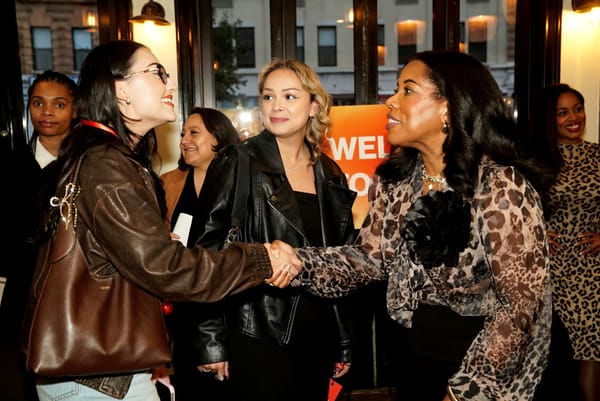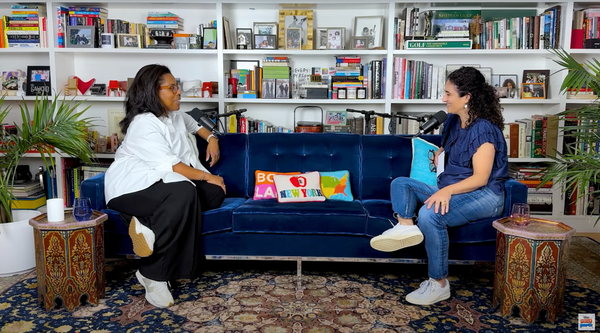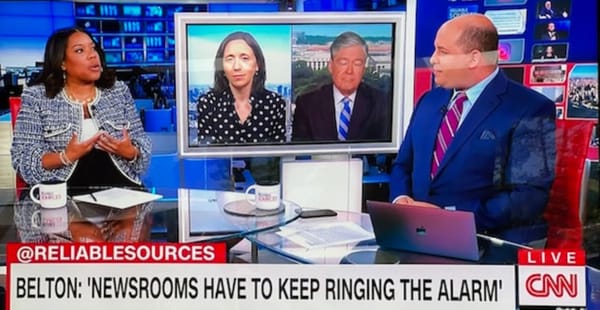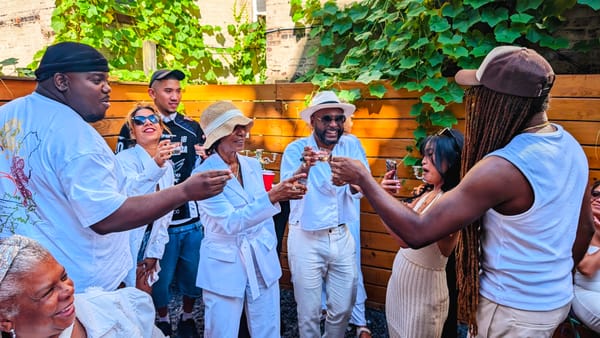'New Life! Who Dis?'
Did Ozempic really change everything, or did I simply change my mindset?
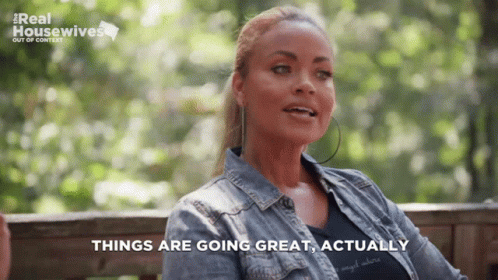
Editor’s Note: Apologies for how long this post is! I wrote it a few months back, and have tried to edit it down several times, but I’m, um, lazy and, honestly, don’t want to pare back the … OMG, this shit is 10 pages??? …. ahem, I didn’t want to pare back the novel that I wrote here about my journey to weight loss and a new love life after two decades of being single. So, um, if it’s too long … sorry! Skip to the end or something. I dunno. But here’s the TL;DR version: I lost 75 lbs and gained better health and a boyfriend, but that shit was a journey, and like with all things in life, nothing is promised, so I’m just gonna try to enjoy it as I’m happier than ever! Now read this War & Peace clone at your own peril!
I was a skinny kid.
Long legs. A concave stomach. The only sign of what would come was my rear, which even at age 6 I remember thinking looked like a letter “P” next to my spindly legs. It was round, very round and I hated it.
After all, it was the 80s and 90s when what was considered “big” was anyone over a size 6 in women’s clothing. One of the most popular stores amongst my peers as a teen was 5-7-9, which was really 0-3-5 in women’s sizes. Meaning, by the time I was old enough to shop there, I could fit nothing. I remember looking so longingly at the tiny, tiny clothes and being envious of the much smaller girls, particularly those who were white or Asian, who could fit those clothes and double-cross their legs under their desks when I could barely get my knee over my thick thighs one-time without a desk in the way.
Because after being skin and bones for almost all of elementary school, by age 13, I had “blossomed” or, in my mind, become ruined by developing a “womanly body.” It was awful to have a butt, thighs, and round legs. It attracted all the attention I did not want. Boys said gross things to me. Grown men propositioned me and catcalled me all the time. I used to try to cover everything up, but it didn’t matter. I had a butt so big and hips so wide that no oversized sweatshirt could properly contain them. Plus, I knew, just knew, that at 115 lbs and only 5’3” in stature, I was “fat.”
The Substack of the Writer Formally Known As The Black Snob is a reader-supported publication. To receive new posts and support my work, consider becoming a free or paid subscriber.
After all, that was the message I got from everyone — magazines, my grandmother, society, my parents — that something was “wrong” with my body. Everyone commented constantly on my what would be called now a “slim thick” frame. But because I just knew I was fat, I didn’t bother to diet or reign in my eating habits. It didn’t matter. Even when I tried starving myself or exercising religiously, I could not lose the “gifts” God had given me. Hell, I didn’t even see them as gifts, they were so unwanted. Why couldn’t I be shaped like the girls on TV or in videos who were always so much smaller — tiny waists, slim, non-existent thighs, flat stomachs to show off in low-rise jeans (the bane of my existence), and overly “petiteness” which I equated with femininity. It also didn’t help that my mother was only 95 lbs when she married our father, and in her 30s she was around 130 lbs and saw herself as fat and was constantly on a diet of some kind. If she was fat, and she was not fat, then I had to be huge.
I hated my body. I was at constant war with it. But high school solidified my worldview based on the treatment I received from others and the message I got from TV and magazines — my body had no place in polite society. It was offensive. The only person who seemed to recognize my pain was, of all people, Sir Mix-A-Lot, who wrote an entire song dedicated to how much he liked “thick” sistas in the legendary track “Baby Got Back,” a song burned into my memory that, to this day, I know all the words to. The line “So Cosmo says your fat, I ain’t down wit that” told me everything I needed to know — I was being brainwashed by a fashion industry, by a weight-obsessed society, that said for me to deserve to take up space I needed to physically take up as little of it as possible. It was cruel.
But knowing something is a lie and having to live it are two different things. I knew I was being set up to fail, but rather than fight it, I succumbed to it.
The reality was, I didn’t have the energy — mentally or physically — to keep up a strict diet or exercise regime because I was trying to do these things with one hand tied behind my back. Meaning, after my turbulent 20s when I struggled with severe depression, suicidal ideation, and anxiety, I was diagnosed at 28 with Bipolar Disorder. An illness marked by severe mood swings and, at times, lack of impulse control. I went through a horrid guinea pig phase where I tried a multitude of treatments in hopes of reaching a point of stability. At one point, I was on as many as seven medications but wasn’t getting any better. Finally, in the Spring of 2009 at 31, I was taken off the bulk of these meds and put on two medications — a newer mood stabilizer and an antidepressant — and they worked. The downside? All the psych meds I was on, whether 7 or only 2, caused weight gain. So I had a choice — be sane or overweight.
Since I had the distinction, according to my doctors, of being “a healthy obese woman,” I chose to be overweight.
And I hated it.
I didn’t accept my fate right away. I thought I could out-think it, out-maneuver it. I would go through periods where I’d work out every day and others where I could barely function. I would hire trainers to modify my diet and put me through grueling workouts. I would try different fitness activities in hopes one would stick. I would always lose weight initially, plateau after about 30 or 40 lbs of weight loss, then gradually gain the weight back. I considered weight loss surgery, but after getting an initial approval from my doctor I learned my health insurance wouldn’t cover it. And years later, even after I could afford it, I chose not to after hearing horror story after horror story of people who lost weight from surgery just to gain it all back, but now had health complications related to the surgery AND obesity.
So, after years of gaining and losing the same 40 lbs over and over, by age 40, I gave up. I accepted that it would probably be unlikely that I’d ever be able to keep the weight off and stay healthy mentally, so I would just focus on staying mentally well and not gaining MORE weight. At the time, I was between 245 and 255 lbs after losing about 25 lbs from working out and going on a Paleo diet.
Then, 2020 happened.
A lot of people gained weight during the pandemic, but I gained almost 40 lbs becoming the heaviest I’d ever been at 287 lbs. I bought a treadmill I couldn’t bring myself to use because I was so depressed over being in lockdown. My agoraphobia, a hallmark of my 20s, returned with a vengeance, and I was lonely, trapped in my house for about five months.
Pre-pandemic, I was out almost every night of the week at social engagements, events, and galas. My calendar was full of dinners, lunches, happy hours, film premieres, and parties. I hung out with my friends constantly and spent as little time in my house as possible. Some of that was because I lived in Manhattan where apartments are shockingly small and space is at a premium. But it was mostly because I suffered from severe loneliness. I hated being by myself all the time. It was borderline intolerable, something rooted in my childhood. I was always the kid who hated being isolated. So when I got in trouble as a child, my parents would send me to my room where I would cry and cry until I could rejoin my family. So the pandemic hit me hard.
I fell into a depression and decided to eat my way through it — baking pies, baking quiches, making elaborate meals and even starting a food insta. My cooking skills advanced considerably, and so did my waistline. Soon my office chair wasn’t sturdy enough to support me, long walks left me winded, and going up and down stairs was a heavy-breathing nightmare. I was so uncomfortable in my own body but didn’t know what to do to fix it. I tried the usual — getting a trainer and going back on a strict diet once restrictions eased up a bit — but did not get the usual results. Despite working out several times a week for an hour, I wasn’t making any progress. Devastated, I wondered if I could accept and love myself at my heaviest.
I wish I could say that I did love myself then. But I didn’t. I didn’t love myself as an obese woman. And never had. I tried to immerse myself in “fat acceptance” and “body positivity,” but it was all a lie for me. I didn’t feel good. I didn’t like how I looked.
Even though I’d been overweight most of my adult life, and it had never stopped me from achieving anything professionally, in the back of my mind I always wondered what my life could have been like if I’d just been smaller. After all, many people are shallow and superficial, often not looking past my weight to see me as someone worthy of dating or friendship. I would remember the last time I was under 200 lbs (2009) or that time I lost 45 lbs to get down to 215 in 2012 and how good I had looked. If only I could get back there. I didn’t even want to be 115 lbs or something crazy, I just wanted to not be a size 22 anymore. Maybe get back to 14/16. But mostly I wanted to feel good and attractive again. I wanted to feel like me. And I simply never felt like me at 287 lbs.
But because of this battle of the bulge, I had a lot of shame and unhappiness. Talking about my weight and the situation I blamed myself for getting into was a sore point. My primary care physician, a fit and attractive Black woman, begged me to consider my knees and joints and the pressure I was putting on them. I saw her as a skinny, nosy busybody selling me dreams. How could she know what I was going through? As far as I knew, she’d never been more than 100 lbs overweight. She didn’t know how many times I’d had this conversation with doctors. How long I’d tried. How I’d suffered emotionally and physically. She didn’t feel as terrible and guilty as I felt. She didn’t know my life.
Still, she persisted.
It was the summer of 2021 and she begged me to see a weight loss specialist at NYU’s Langone Hospital. “She’s a Black woman too and very good,” my PCP said while I folded my arms and frowned. All I knew was I wasn’t going to do surgery and if this woman recommended it, I was walking out. But sure, I said, I would talk to her. Even though I did not want to. Since the doctor was very in demand, she didn’t have appointments until that November, so I made one and forgot about it, going about living my life at 287 lbs.
I was dating a guy at the time who dumped me in August for a younger, thinner woman. He had been the first person I’d dated consistently since 2012. Even though the relationship wasn’t serious, it had been my longest relationship in two decades. We dated off and on for about six months. It was pleasant even if I didn’t love him and he didn’t see a future with me. It ending was hard on me mentally as winter was coming and I was about to spend another season freezing in isolation, cold and alone, as I had since my divorce almost 20 years ago.
I am, as I wrote, not a loner. So the pandemic made one thing very clear, I needed to get serious about finding a partner. A lot of my problems were rooted in my loneliness — overeating, overspending, going to bed at 6 p.m. because there was nothing to do. So I decided to do something about it. I joined Hinge and would swipe through it until I ran out of men to swipe on. I went out constantly, to sports bars and small gatherings, in hopes of meeting someone. I told everyone I was looking, something I’d never done out of shame that I’d been unable to make this happen on my own.
By 43, I was dating quite aggressively and without shame in my pursuit of love. It was really hard at first because I was so inexperienced after essentially being on a dating strike since 2012. I got my feelings hurt a lot. I was sensitive and came on too strong. But even after I calmed down and developed a thicker skin, I was still the one or two date queen, often getting ghosted as men disappeared from my life like one-off side characters on the old teen 90s sitcom “Saved By the Bell” — never to be seen or heard from ever again.
I thought with this guy we could just date each other until we both figured out what we wanted. But my little ego could not handle that he had found what he wanted and I had not. I was jealous. Not of the woman, but of him. How could he find what he wanted while I was still out here struggling? How was it so easy for him, but seemed impossible for me?
So this was the mindset I was in come November when I met with the weight loss doctor. Fat, lonely, miserable, and recently dumped. The only thing that seemed to be close to firing on all cylinders was my career, and even that it was a monumental struggle as I adjusted to my new role at HuffPost.
I just knew this woman was going to recommend surgery. I knew it. And I knew I’d be sad and would reject it. Because what options were there really for me? I wasn’t going to stop taking my psych meds ever again, so all initial weight loss would be futile — if I had any at all.
I was almost immediately emotional as I tried to verbalize my feelings about my weight. While it was fine to mutter under my breath to myself my self-hatred, saying it aloud to a stranger was a whole other thing. It made it real. And that made me upset. But to my surprise, the doctor, who was kind, pleasant, and understanding, did not suggest surgery, but a new drug called Ozempic. Meant initially to treat diabetes, the drug had the side effect of suppressing your appetite, making you feel full faster and less hungry. The doctor thought I could lose as much as 10 percent of my body weight — a little under 30 lbs. — but with a meal plan and exercise could lose even more. She told me Ozempic had the effect of counteracting how my Bipolar medications made me want to eat and gain weight. It was a bit of hope in a situation that had felt impossibly bleak. But I was skeptical. Most things that are too good to be true, are.
Shortly after I started taking Ozempic, an injectable that I had to give myself a shot of once a week, I was diagnosed with a blood clot in my left calf, a personal nightmare and something I likely got from sitting for two years of a pandemic, gaining weight and being miserable. So soon I was on blood thinners on top of my psych meds and Ozempic. I felt like such a loser. But then something crazy happened — I actually started to lose weight, a lot of weight, quickly.
That first month, December 2021, I lost 15 lbs. That January, I lost another 10. By March, I lost more than 30 lbs. And by the summer — 50 lbs.
Within the span of a year in 2022, I lost about 73 lbs, going from a size 22 to my “dream” size — a 14/16, and getting back down to 215 lbs. It was like a time machine. I suddenly had more energy, was happier, and needed a whole new wardrobe (which didn’t help with my shopping issues, but needless to say, I was happy to spend the cash for this reason). That August, while on a trip to Las Vegas for the National Association of Black Journalists convention, I would meet a man who would become my first serious long-term relationship in 20 years. Introduced to him by a close friend, we were excited to learn we both lived in New York — him in Brooklyn and me in Harlem. So we entered what I joked was a long-distance relationship, since our burroughs were nowhere near each other and it took, often, 45 minutes to an hour to see each other.
But Ozempic wasn’t all weight loss and new boyfriends.
First, my health insurance wouldn’t cover it initially so I had to pay for it out-of-pocket. The drug is NOT cheap. I ended up spending about $900 a month, rationalizing I’d spent more on trainers and fad diets in my lifetime, so something that actually worked was worth the cost.
Second, because I was eating so little, my nutrition went down to nearly nothing and my body acted about the same as it would if I had been anorexic. I was chronically anemic and suffering from various mineral deficiencies. Soon I developed colds that wouldn’t go away and various infections that lasted months. Normally I’m never sick, only getting ill once or twice every year or two. In 2022, I was sick at least seven times over the span of six months, including one bout with COVID, plus stubborn infections.
Also, Ozempic does cause nausea (and constipation and, at times, diarrhea). Not the worst side-effects, but not the greatest either. Eating became a complete chore at times, and my relationship with food and alcohol changed drastically. Because it had to. I’d make myself sick otherwise due to the combo of nausea and more than a glass or two of alcohol made me throw up.
By the spring though, it was apparent that I was a good case for the drug as I’d already lost nearly 40 lbs and gained with it a sense of feeling more like myself after being at war with myself for years. Out of that peace, I was making with myself came more confidence which radiated wherever I went. Sure, I still had my bouts with imposter syndrome (that wasn’t going away easily), but I no longer had as many issues with my appearance.
Then, thank goodness, my doctor put me on Wegovy, essentially the same as Ozempic, but designated specifically for weight loss, so now my insurance would actually cover it. At the same time, I also tried to eat healthier, went on a multivitamin (including regular iron and zinc tablets), and re-signed up with an old trainer who specialized in high-intensity training. By October 2022, I felt like me again on pretty much every level. Hell, I felt better than “me.” I felt like the ideal, optimal version of myself. The one I used to dream about at night. The one I always wanted to be. The person I felt like on the inside now matched my outside for the first time in more than 20 years.
At the same time, I was getting a better grasp on my role at HuffPost thanks to support from my friends at Chief — a membership org for women aspiring or currently in the C-suite, and by hiring an executive coach while getting a new, more proactive therapist. I started doing more speaking engagements, and meeting new people while re-establishing old relationships that had gone neglected in the pandemic. And my romantic relationship was — a first for me — actually rewarding, supportive, and healthy. Past men I dated had tried to control me as if I were more a possession than a person. I was used to constantly being gaslit or on edge. Being able to relax emotionally in a relationship where any issue could be talked out rationally caused me to flourish. The confidence I developed from his love and support was so profound, it led to me gaining some new friends while resetting other relationships where I felt there were issues.
But probably the biggest adjustment has been watching others who I’ve known for years change their overall responses to me — both positively and negatively — over my weight loss. After decades of being “invisible” to certain people, suddenly I was the belle of the ball. All the quirks, personality traits, and oddities that had always made me “me” were a good thing when in the past, I think people just thought I was some odd, socially-awkward, chubby woman. Which honestly was mostly a projection or an assumption based on not knowing me very well to start. Even at 287 lbs, when it came to my professional bona fides, personality, and talents, I was borderline arrogant, I was so confident. And I really, really like my personality — which is a fashionable mix of extroversion, kindness, creativity, empathy, sensitivity, and wit marked with occasional bluntness — and have refused to change much of it since I was 10 years old. Seeing people just respond to me existing at 287 lbs versus at 205 lbs (where I am now), was fascinating. It was like I was popular overnight.
Part of me was offended that it took me losing more than 75 lbs to be seen again by all sorts of people. After all, I was still “me.” Was “me” at my heaviest THAT offensive to people? But my best friend, Jada, put it differently, seeing it as not being dissimilar from when he put on weight and muscle after being a tall, skinny kid most of his young life. Suddenly, girls who had never noticed him loved him. And more people paid attention to and respected him. He saw this as a “good” thing, when I, someone who at least attempted to embrace body positivity, saw it as superficial.
Still, I preferred the fickle superficiality of people suddenly noticing me to the alternative that I’d lived with for decades.
But now I have a new problem. I call it the “Flowers for Algernon” problem. Or Algernon Syndrome for short. Basically, in the 1959 short story “Flowers for Algernon” by Daniel Keyes, a lab rat is experimented on in a way that increases its intelligence. At the same time, a developmentally disabled man undergoes similar treatment. The man also becomes more “intelligent,” and starts to lead a better, more fulfilling life as a result. But in the end, both the rat and the man lose the gains they’ve made and revert back to their former states. The book ends with the protagonist vowing to try to regain what he has lost even though it is unlikely and his future is uncertain.
The thing with Wegovy (and similar medications) is the minute you stop consistently taking the injections, all the cravings, all the desires for food come back with a vengeance and you regain the weight. So much like my antidepressant and mood stabilizer to treat Bipolar, this would be a drug I’d potentially be on for most of my life. My doctors both assured me that in their research and understanding of the diabetes medication — which is meant for people with diabetes to stay on long-term to treat their illness — could do the same for my obesity.
But, plot twist, I could also develop a tolerance at some point to the drug, which happens to some people, and the weight loss effects could go away. There’s also some uncertainty about what the long-term effects will be for anyone living on this medication.
It’s an impossible situation, much like living with my Bipolar disorder, in that I have to make a choice. Add another medication to my arsenal and continue to lose weight or at least maintain the weight I am now, and live with whatever side effects or expenses that come with it, or go off the medications and risk becoming overweight and invisible again. In the devil’s bargain of some occasional saggy skin and nausea versus being invisible, I chose the saggy skin and nausea. And much like my feelings about my Bipolar medication, I have no intention of going off any drugs I’m currently on anytime soon unless my doctors advise it, or it unfortunately stops working for me.
Bipolar is a chronic condition. And obesity, for me, has been a chronic condition since my late 20s. I know I can always eat better, eat less, or work out more. I recently took up tennis as a hobby and hope to learn to swim this August. But if the past is prologue, I know that it will never be enough to counteract my psych meds, my mental health condition, and its weight-gaining, lack of impulse control properties.
So for now, I live with this Sword of Damocles over my head in the form of regaining 75 lbs and losing the life I now love. I am currently the happiest I have ever been in life at 45 years of age. I have never been more fulfilled, mentally stable, even-keeled, or healthier, wealthier, and happier than I am now. I’m glad I did whatever it ultimately took to regain this love and confidence for myself, which one could argue, never truly existed in its purest form because of the self-loathing I had over my body in my teens and early 20s.
I don’t know what the future holds. But I’m not one to ignore or not embrace who I am. I’m not going to spend this time worrying about what may come to pass when I can simply enjoy the love and contentment I feel now.
Recently I got a new place and moved to Bed-Stuy. Partially because I wanted more space and a backyard, but mostly because I wanted to be closer to my boyfriend. I wanted to see where this relationship could go if I dedicated the time, space, and energy necessary for it after neglecting my personal life for years.
If I have any advice, it’s that with everything, take that time, space, and energy for the things that matter most to you. Do not wait until the “ideal” moment to take that vacation, wear that bikini or find the love of your life. Nothing is promised. Not the future. Not thinness. Not popularity. Not wealth. Not health. Seize your life now. If I had waited to be my ideal size to find love, I’d still be lonely and single. If I had waited to be thinner for my career, fashionability, or friendships, I wouldn't have the job I have now, wouldn’t have any friends and I would have worn potato sacks instead of my beloved bikinis, skinny jeans, and fancy, ornate kimonos and kaftans. You are deserving of the love you want, right now, in whatever form you may be. Never stop trying to be your best self, but live your life while doing it, however your self may be at this time.
It definitely gets better if you keep trying. But for it to get better, you have to take a risk. To paraphrase something legendary radio host Donnie Simpson used to say: shoot for the moon, that way even if you don’t make it, you’ll always be among the stars.
Go for what you want. You never know. You just might get it. And even if it’s fleeting, it’s better to experience your dreams coming true, than never pursuing them at all.
The Substack of the Writer Formally Known As The Black Snob is a reader-supported publication. To receive new posts and support my work, consider becoming a free or paid subscriber.
